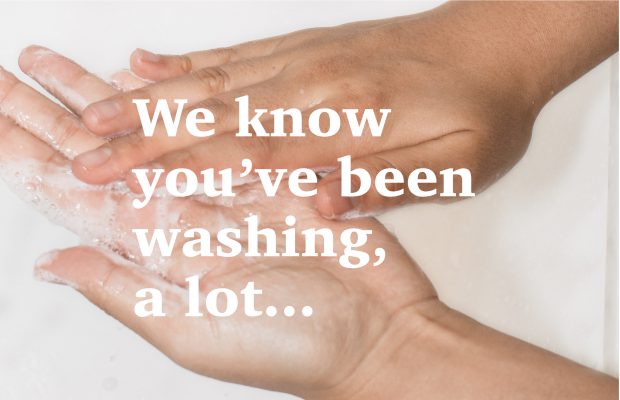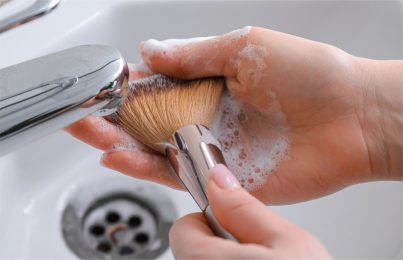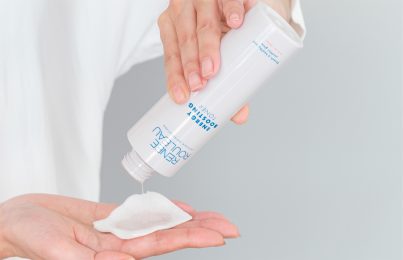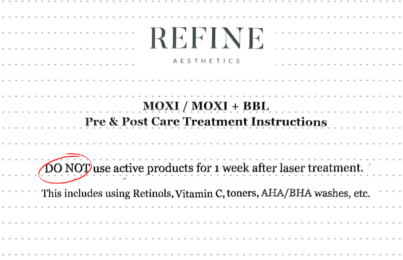Updated 01/11/22. We’re all washing our hands constantly, which means many of us are experiencing dryness, irritation, and even cracked skin as a result—especially now that winter is here. Frequent hand washing, while incredibly important for our health, can be very hard on our hands (as can hand sanitizer) since it puts strain on the skin’s moisture barrier. Keep scrolling to see eight ways to keep your hands happy and hydrated even while constantly cleaning them.
8 Ways to Prevent Dry Hands From Frequent Washing
While it may seem like frequent hand washing will inevitably lead to scaly hands and cracked knuckles, there are definitely preventative measures you can take to minimize its drying effects. Here are my expert tips.
1. Use a Moisturizing, Sulfate-Free Hand Wash
You’re probably already familiar with sulfates, as they’re found in a lot of different beauty products. Sulfates help create a lather. They are a type of surfactant, which is a cleansing agent that breaks down oil and grime on the skin. While breaking down oil and grime sounds like a good thing, the problem is that sulfates also strip away your skin’s natural, protective oils and pull water out of the skin. This makes them incredibly drying.
Since we’ve all upped our hand washing game, I suggest steering clear of sulfates if possible. I also suggest avoiding bar soaps, since these tend to have a high pH and can also dry out the skin. Instead, look for hand soaps with a creamy consistency. Good ingredients to look for are glycerin and shea butter. These will help replace some of the moisture lost through hand washing.
2. Wash Hands With Tepid Water
It can be tempting to rinse your hands with hot water when you really want them to feel clean, but trust me when I say this is unnecessary and will only cause excess dryness. Instead, use tepid water. The key here is making sure you rinse your hands well. Instead of blasting them with hot water, just take your time and be thorough.
3. Don’t Scrub Too Hard
When you’re constantly washing your hands, the last thing you want is to be aggressive with your skin. Aggressive scrubbing won’t get you anywhere. Again, it’s better to be gentle but thorough and to really take your time when washing your hands to make sure you get every little nook and cranny — including under your nails. Once you’ve finished, resist the urge to rub your hands dry with a towel. Instead, gently pat them dry.
4. Wear Rubber Gloves While Cleaning
Another great way to protect your hands from unnecessary dryness is to wear rubber gloves while cleaning or doing dishes. Both of these activities can mean dunking your hands in and out of hot water. Add in some of the harsh chemicals found in cleaning products, and you’ve got a recipe for red, raw hands.
5. Moisturize Often
This one may seem obvious, but it really is so important to apply moisturizer after each and every hand washing. I know it’s easy to get lazy about moisturizing, especially when you’re washing your hands so often, but leaving them bare will lead to water evaporating from the skin, which causes the tightness and dryness that can eventually lead to cracking (not to mention redness and irritation).
Regularly moisturizing your hands will help keep the skin’s moisture barrier intact. This is important because when our skin’s barrier is compromised, it develops tiny cracks that let moisture out while letting irritants in. I suggest keeping moisturizer next to the sink to remind yourself to use it frequently. If you’re out and about, carry hand cream with you so you have easy access to it after washing.
6. Apply a Salve or Ointment at Night
If you have extremely dry hands from washing, apply a thick ointment or salve at night while you sleep. Focus on occlusive ingredients—the key is creating a barrier over the skin so moisture stays in and can’t escape. This is one time when greasier hand creams are better! In fact, if you have a face cream that didn’t work out because it was too heavy or broke you out, don’t throw it away! Use it on your hands, instead.
If you already have cracks on your hands, start by applying Neosporin. This can help speed up recovery and prevent infection.
7. Apply a Cuticle Oil
After you’ve applied a salve or ointment, use an oil on your cuticles and any other areas where you’re experiencing irritation or cracking. This can help keep the skin intact so it doesn’t crack from dryness.
8. Wear Cotton Gloves While You Sleep
When my hands are feeling extra dry, I like to wear cotton gloves to bed. Doing this takes things to another level by creating a physical barrier that will keep moisture from escaping. I also like doing this because it keeps thick, potentially pore-clogging hand creams off my face while I sleep.
If you’re wearing gloves to bed, you can also use a layering technique. Start by applying a regular lotion for more water-based hydration. Then, use a thick cream or salve to create a seal and lock that moisture in. Top it all off with your cuticle oil, add cotton gloves, and you’re sure to wake up with soft, smooth hands.
My Favorite Hand Creams
I thought I’d share a few recommendations of hand creams I’ve been loving lately.
For Daytime Use
During the day, I like Lano Hand Cream Intense in ‘Rose.’ I love this one because it’s thick and moisturizing, but dries down really fast so it doesn’t leave greasy marks all over my phone! There’s nothing worse than getting gooey hand cream everywhere.
Lanolin is a good ingredient to look for in hand cream in general. It’s essentially the sebum that sheep produce and it has a lot of characteristics similar to human sebum, so it can help restore lipids and support the moisture barrier.
For Nighttime Use
When my hands are super dry and I want an ointment to wear under cotton gloves, I like to use Bedside Body Balm. I also use this on my feet with socks and it really does work.
One more thing. If you have really severe dryness, itching, or cracking, consult a dermatologist for the appropriate treatment (which may be a steroid cream). Severe eczema can make your skin more vulnerable to infection and should ideally be taken care of sooner rather than later. It’s worth calling your derm’s office or using a service such as Teladoc to see if this is something that can be prescribed remotely since it’s pretty straightforward.
I hope you find these tips helpful! I know a lot of us are struggling with dry hands right now, but let’s keep up the thorough hand washing. Hoping you all stay healthy and safe. XX Renée
Celebrity Esthetician & Skincare Expert
As an esthetician trained in cosmetic chemistry, Renée Rouleau has spent 35 years researching skin, educating her audience, and building an award-winning line of products. Her hands-on experience as an esthetician and trusted skin care expert has created a real-world solution — products that are formulated for nine different types of skin so your face will get exactly what it needs to look and feel its best. Trusted by celebrities, editors, bloggers, and skincare obsessives around the globe, her vast real-world knowledge and constant research are why Marie Claire calls her “the most passionate skin practitioner we know.”



